Working with actors on set can be a rewarding experience if you focus on building trust and open communication. Make sure your actors feel valued by listening to their ideas and respecting their unique processes. Keep feedback constructive and highlight their strengths too—everyone loves a confidence boost! Stay adaptable; unexpected changes often lead to creative breakthroughs. And don’t forget about their space—actors need time to connect with their roles. Create a supportive atmosphere, and keep distractions to a minimum. If you’re keen on even more valuable insights, there’s plenty more to explore!
Key Highlights
- Build trust by fostering relationships and creating a safe environment for actors to express themselves creatively.
- Communicate clearly and effectively, using simple language and maintaining open lines of dialogue throughout production.
- Respect each actor’s unique preparation process, allowing them the space they need to connect with their roles.
- Provide constructive feedback that highlights strengths while offering actionable suggestions for improvement.
- Manage the environment by minimizing interruptions and scheduling breaks to enhance focus and prevent burnout.
Build Trust With Actors
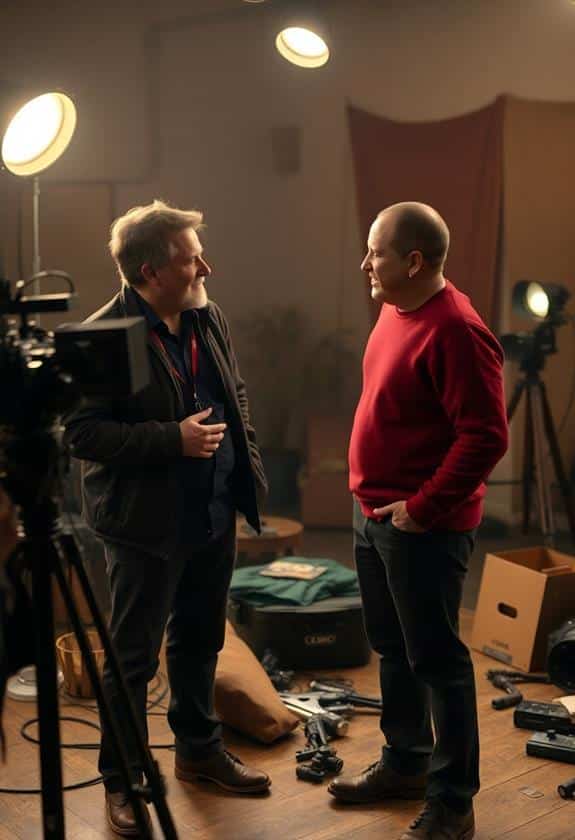
Building trust with actors is crucial for a successful production. When you’re on set, creating a safe environment where actors feel valued can make all the difference. You might remember a time when you felt nervous about performing—how reassuring it was when someone believed in you. That’s what you want to provide your actors. Additionally, having the right critical filmmaking equipment can help facilitate a smoother working relationship by minimizing technical distractions.
First, be open and approachable. Share your vision, but also listen to their ideas and concerns. When actors feel heard, they’re more likely to take risks in their performances, leading to a more authentic portrayal. I once worked with an actor who had a great idea for a scene. By taking the time to incorporate it, our final product was much stronger, and the actor felt like a crucial part of the team.
Also, make certain that everyone understands what’s happening on set. Clear guidelines about safety and expectations help everyone feel secure. You don’t want anyone feeling like they’re walking a tightrope without a safety net! Remember, building trust takes time, but by nurturing those relationships, you’ll create an atmosphere where creativity can flourish, making your production truly shine.
Communicate Clearly and Effectively
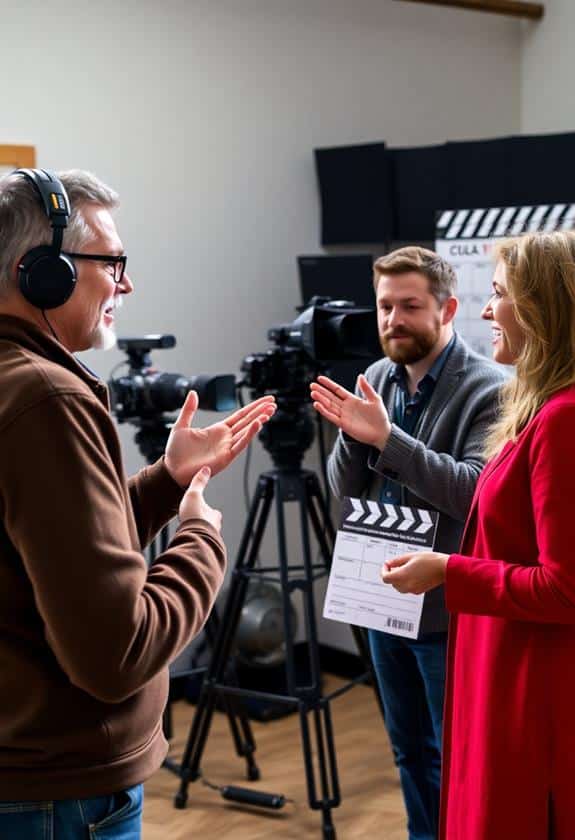
Effective communication is the backbone of any successful film set. When you’re directing or working alongside actors, it’s vital to express your ideas clearly. Imagine trying to convey a complex scene, but your words get tangled up—confusion can lead to mistakes or even accidents. To avoid this, always be direct and use simple language. For instance, if you need them to capture the right emotions, consider how audio quality influences performances; clear direction can help actors focus on delivering their best work.
For example, instead of saying, “Could you possibly consider adjusting your emotional delivery?” just say, “Try showing more excitement here.” It’s easier for everyone and helps create a safer atmosphere.
Also, don’t forget to listen! When actors share their thoughts or concerns, it’s important to acknowledge them. If an actor feels uncertain about a stunt, take a moment to discuss it. You want them to feel secure and confident in their performance.
And remember, a little humor goes a long way! Lightening the mood can ease tension, especially during intense scenes. Just be sure your jokes don’t distract from the task at hand.
Foster a Collaborative Environment
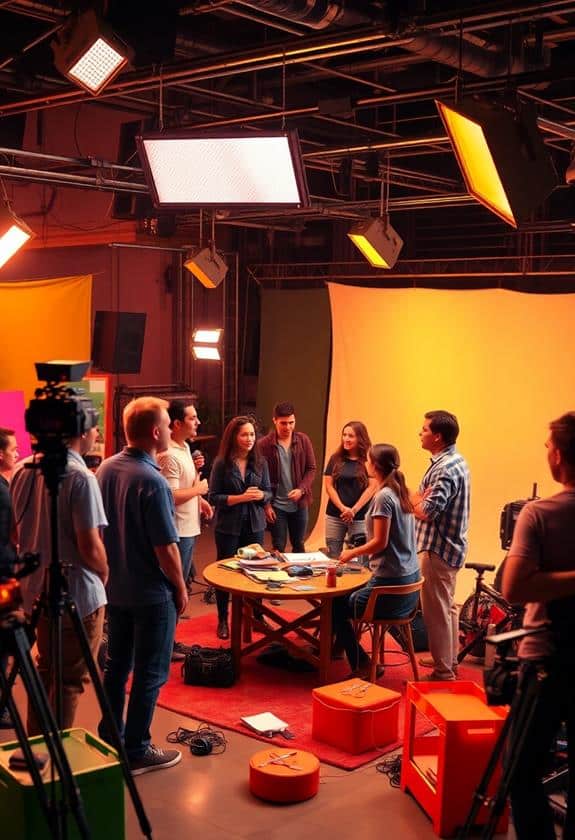
Creating a collaborative environment on set is essential for fostering creativity and trust among the cast and crew. When everyone feels safe to share their ideas, magic happens! You’ll want to encourage open communication and make sure everyone knows their voice matters. Utilizing effective lighting gear can also enhance the mood and atmosphere of the set, helping to inspire creativity and connection, such as with the versatile lighting options available for filmmakers. Here are a few tips to help you create that supportive atmosphere:
- Gather for a pre-shoot circle: Start the day by bringing everyone together. It’s a great way to share thoughts and set the tone.
- Celebrate small wins: Acknowledge the hard work of the team, whether it’s nailing a difficult scene or perfecting a prop. Everyone loves a little recognition!
- Encourage playful brainstorming: Let actors pitch ideas or improvise. You never know what brilliance might emerge from a silly suggestion.
- Create a safe feedback loop: Make it clear that constructive criticism is welcomed, but personal attacks are not. This keeps things positive and productive.
When you foster a collaborative environment, you not only boost morale, but also pave the way for creative breakthroughs. Remember, a happy set is a productive set!
Understand Their Process
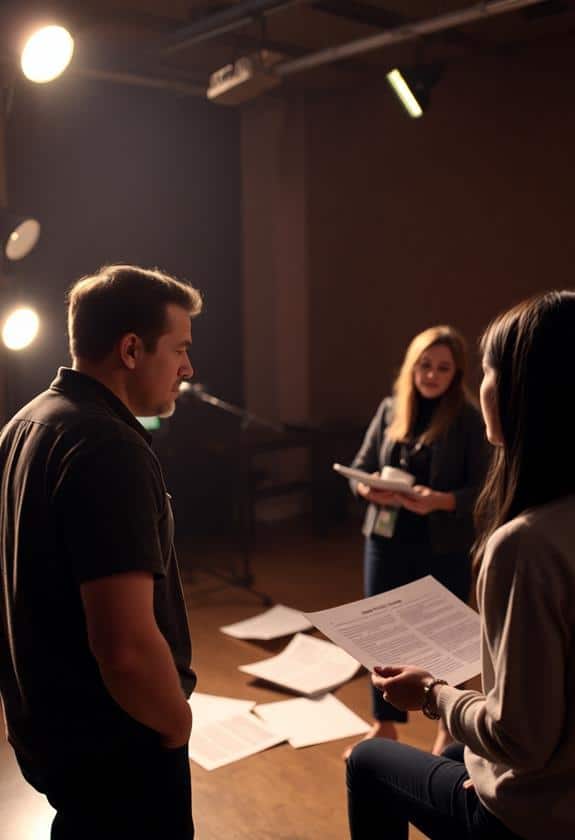
Understanding an actor’s process is key to maximizing their performance on set. Every actor has their unique way of preparing for a role, and getting to know that can make a world of difference. Some actors dive deep into their characters, while others prefer a lighter touch. I once worked with a talented actor who liked to walk around the set, soaking in the atmosphere. It helped him connect with his role, and when I learned to give him that space, the performance soared!
In addition to understanding their methods, having the right equipment can also enhance the clarity of their performance, especially with top microphones for filmmaking ensuring every nuance is captured. You might notice that some actors use techniques like method acting, where they truly embody their character’s emotions. Others might rely on improvisation or workshopping scenes. Take the time to chat with them about their approach; it’s not just about the lines, but how they feel in the moment.
Creating a safe environment is essential. When actors feel secure and understood, they’re more likely to take risks and deliver those unforgettable performances. So, lean in, listen, and respect their process. You’ll not only enhance their work but also build a collaborative spirit that makes the entire experience enjoyable for everyone on set!
Provide Constructive Feedback

While you might feel hesitant about giving feedback, providing constructive criticism is essential for an actor’s growth on set. Remember, your goal is to help them shine! Start by creating a safe space for dialogue, and focus on what they can improve without discouraging them. Consider how a well-placed high-definition recording can capture their performance details that can be referenced for feedback. Think of feedback as a gentle nudge in the right direction.
When you deliver feedback, try to keep it specific and actionable. For example, you might say:
- “Your energy in that scene lit up the room!”
- “Maybe try a softer tone next time to bring out the character’s vulnerability.”
- “I loved how you used your body language; it really conveyed the emotion!”
- “Let’s explore a different take on that line for a fresh perspective.”
Be Adaptable and Flexible
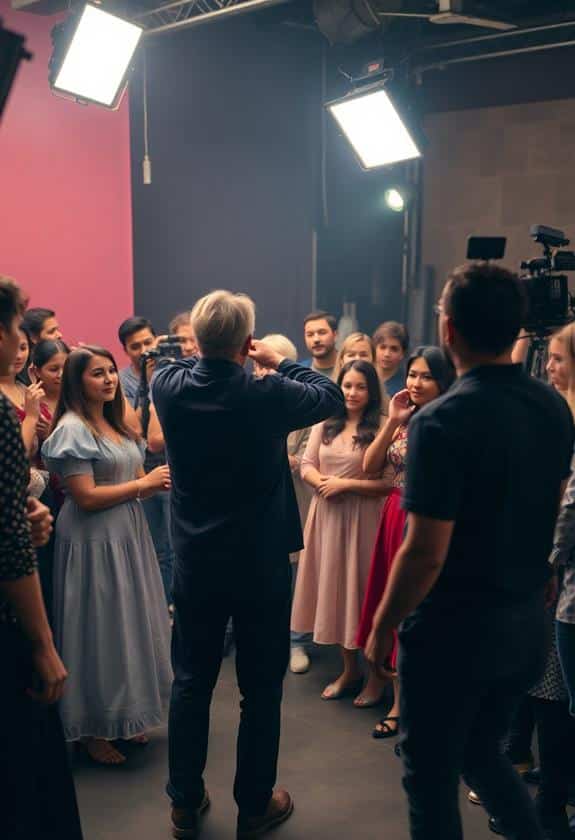
Adaptability is key when working with actors on set. You never know when something might change, whether it’s the weather, an actor’s mood, or even a last-minute script revision. I remember one shoot where we had planned for a bright sunny day, but clouds rolled in, and we had to shift everything indoors. Instead of panicking, we quickly rearranged the set. The actors appreciated our flexibility, and it turned out to be one of the best scenes we shot!
When you stay adaptable, you create a safer, more supportive environment. If an actor needs to try a scene a different way, be open to their suggestions. Sometimes, their creative instincts can lead to unexpected magic. I’ve seen actors shine when given the freedom to improvise, which often brings out the best performances, even if it means straying from the original plan.
Respect Their Space and Time
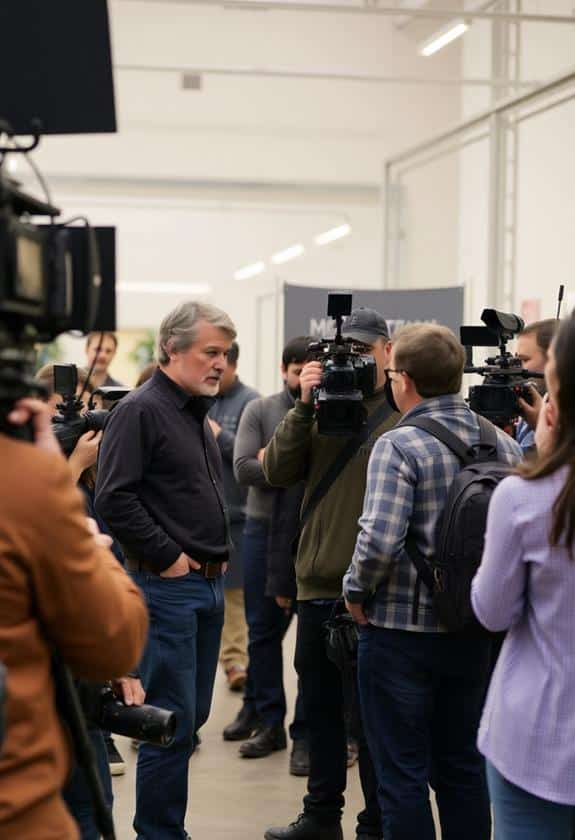
Respecting an actor’s space and time is fundamental to fostering a productive atmosphere on set. When you give actors the room they need, it helps them focus and perform their best. Remember, they’re not just playing a role; they’re also human beings with feelings and lives outside of filming. Here are some ways to respect their space and time:
- Create a quiet zone where they can prepare mentally before scenes.
- Minimize interruptions, especially during rehearsals or when they’re in character.
- Stick to the schedule as much as possible; time is precious in filmmaking.
- Be mindful of personal space, ensuring they feel comfortable and safe.
I once worked on a short film where an actor was constantly interrupted, and it really threw them off their game. We quickly learned that a little respect goes a long way! By creating an environment that acknowledges their need for space and time, you not only enhance their performance but also build a trusting relationship. So next time you’re on set, remember: a little respect can make a world of difference in creating magic together!
Frequently Asked Questions
How Do I Handle Conflicts Between Actors on Set?
When conflicts arise between actors, it’s important to step in calmly. You can start by listening to both sides, showing them you care. Try to find common ground and encourage open communication. Sometimes, a little humor can lighten the mood, but be sensitive to their feelings. If needed, suggest a short break to cool off. Remember, your goal is to create a positive environment where everyone feels valued and respected.
What Should I Do if an Actor Is Late?
When an actor’s late, picture a clock ticking down, each second echoing like a heartbeat. First, stay calm and breathe; it happens to the best of us! You could send a friendly text to check in, keeping it light-hearted. If they arrive, greet them warmly, but kindly remind them about the schedule. Sharing your own late experiences can lighten the mood, making it clear that time’s important, but so is teamwork!
How Can I Support an Actor’s Emotional Preparation?
Supporting an actor’s emotional preparation can make a difference. You might start by having a relaxed chat about their character, asking questions that help them dig deeper. Create a comfortable space for them to express feelings, maybe even sharing your own experiences to build trust. And, if they need a laugh to ease tension, throw in a light-hearted joke! Remember, you’re in this together, so your support can truly elevate their performance.
What Are Common Misconceptions About Working With Actors?
You’ve probably heard the saying, “Don’t judge a book by its cover.” Many folks think actors are just pretending or that they don’t take their roles seriously. In reality, they invest a lot of emotion and effort into their craft. They’re not just playing characters; they’re telling stories. Sometimes, people underestimate the vulnerability involved. So, when you’re working with them, remember to create a safe space where they can truly shine!
How Do I Ensure Actors Feel Safe During Intense Scenes?
To guarantee actors feel safe during intense scenes, start by creating an open environment where they can share their concerns. Use clear communication to discuss boundaries and establish a safe word. I remember one time, an actor mentioned feeling anxious about a particular scene, and we adjusted it together, which helped. Always check in with them before and after the scene. Trust me, that little extra care goes a long way in making everyone comfortable!
Conclusion
In the end, working with actors is all about connection. You’ll find that when you build trust, communicate openly, and respect their space, magic happens on set. I remember a time when a simple chat turned a tense scene into something truly special. So, take a breath, stay flexible, and embrace the journey together. After all, filmmaking is a team sport, and every actor brings their unique spark. With these tips, you’re ready to shine as a director!




